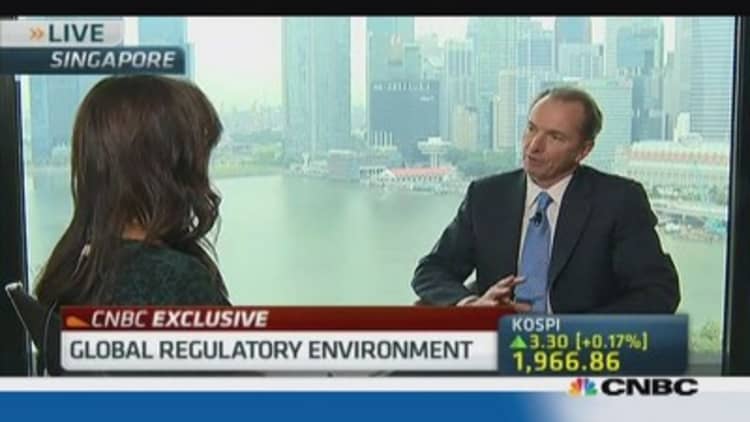The Federal Reserve is considering a delay in the compliance date for the highly anticipated Volcker regulation, giving banks additional time to conform with its provisions, according to people familiar with the matter.
Banks are currently required to comply with the rule – which bans proprietary trading that puts a bank's own capital at risk – by July 2014.
(Read more: Why Goldman is winding down this investment: CEO)
But regulators are still putting the final touches on the long-delayed proposal, and the final rule will probably not be released until December – giving banks less than a year to make changes to comply with the proposal.

The Fed has the option of delaying the compliance date in one-year increments. It is considering pushing out the timing to July 2015 to allow for a phased-in period of implementation, people familiar with the matter said. If the Fed decides to delay the date, the move will probably be announced next month.
The delay would likely include certain conditions, so banks will not get a free pass on the regulation, one of the most far reaching and feared rules to come out of the Dodd-Frank financial reform legislation. Treasury secretary Jack Lew has pressured regulators to implement the rule by the end of this year.
(Read more: Yellen: Fed must promote very strong recovery)
If the Fed does decide to delay the compliance date, financial companies would still have to eliminate pure proprietary trading desks by July 2014.
Other terms may include requiring banks to collect data, make disclosures and implement other measures to build their compliance systems. The conditions are meant to show that banks are making a good-faith effort to comply with the Volcker rule.
More from the Financial Times:
Progress on Volcker rule worries banks
US business group urges Volcker rethink
Barclays warns of more UK branch closures
That could appease those lawmakers and regulators who are pushing for a tough Volcker rule. Advocates of the rule say it is needed to prevent banks from making risky trades that led to incidents like the $6.2 billion derivatives trading loss suffered by JPMorgan in 2012.
But banks are worried that it will curb legitimate activities, like market making and hedging, which firms say are often hard to distinguish from proprietary trading. JPMorgan has argued that the derivatives trading loss was a hedge, not proprietary trading.
The Volcker rule would also prohibit a bank from acquiring or maintaining an equity investment in a "covered fund", which could mean divestments in hedge funds, private equity funds, joint ventures or investment trusts. There are some exemptions, but they are as yet unclear.
(Read more: For Fed Chair Yellen, it was a perfect hearing)
US companies are also worried that the rule could affect corporate bond liquidity, and the US Chamber of Commerce sent a letter this month to US regulators calling for a re-proposal of the rule.

